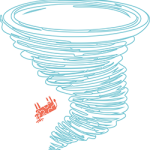Most of us would not seek out active Civil Disobedience. However, you could get caught in a situation when law and order breaks down. This could happen in most any where people gather.
- Shopping areas
- Down town government centers
- During a peaceful protest
- At public gathering or festivals
Public dissent could spread to freeways or targeted businesses. People might participate in violence because of anger towards the system, thrill seeking or intent to commit crime.
If you are in a situation where a riot may break out
Read the crowd, trust your instincts and leave if it feels like something might happen.
Establish a meet up point and keep track of your companions
Know the area you will be entering
Wear neutral clothing, no camo, no black hoodies. If wearing a work uniform try to hide logos or turn shirts inside out.
Stay hydrated
Do not wear a ponytail, scarf or things that can be grabbed
Keep your things in a cross body bag
Wear sturdy shoes
Wear long sleeves and long pants
Carry toothpaste and smear it under eyes if case of tear gas
Wear glasses instead of contacts
Bring your inhaler if you have asthma
Avoid wearing heavy sun screen, makeup or lotions, tear gas may stick to this
Carry googles, latex gloves and ear plugs
Keep your ID and emergency contact info with you
Consider having a second cell phone
Keep your arms at your chest level to protect your lungs if caught in a crowd crush
Get away from the riot
If you are driving, stay calm in your car and slowly leave the area if possible, try not to stop.
Avoid high traffic areas and move away from the riot
Keep children in your arms
Lock Elbows with your companions
If there is a rush of people and you fall, roll up into a ball
Travel in the direction of the crowd
Stay with other people, avoid being alone
Move carefully and purpose fully towards shelter, you may not want to run, instead look for places that are safe.
Avoid chain and luxury stores, which are often targets for looting
Once indoors find a secure place like a basement. However, avoid being alone in a secluded place
Move away from glass windows and doors
Be aware of escape routes in case of fire
Try and get information from news sources, social media or radio
If you get mugged give them your stuff
If some try’s to assault you, be fierce, there is no right or wrong, just survive
If you’re exposed to tear gas or pepper spray
Do not rub your eyes, mouth or nose if hit with tear gas
Use water or saline to flush eyes of tear gas and pepper spray
A solution of half liquid antacid and half water may help to rinse eyes
A spray of half water and half milk of magnesia may help to rinse skin
If you are at home near the disturbance
Shelter in place, keep an eye on the situation and consider moving to a secure location in the home
Stay away from the windows
Have an escape plan
Turn off heaters AC and fans
Stay informed with Social media TV and radio
If you are arrested or confronted by law enforcement
Take this advice from the ACLU
Your rights
- You have the right to remain silent. For example, you do not have to answer any questions about where you are going, where you are traveling from, what you are doing, or where you live. If you wish to exercise your right to remain silent, say so out loud. (In some states, you may be required to provide your name if asked to identify yourself, and an officer may arrest you for refusing to do so.)
- You do not have to consent to a search of yourself or your belongings, but police may pat down your clothing if they suspect a weapon. Note that refusing consent may not stop the officer from carrying out the search against your will, but making a timely objection before or during the search can help preserve your rights in any later legal proceeding.
- If you are arrested by police, you have the right to a government-appointed lawyer if you cannot afford one.
- You do not have to answer questions about where you were born, whether you are a U.S. citizen, or how you entered the country. (Separate rules apply at international borders and airports as well as for individuals on certain nonimmigrant visas, including tourists and business travelers. For more specific guidance about how to deal with immigration-related questions, see our immigrants’ rights section.)
How to reduce risk to yourself
- Stay calm. Don’t run, resist, or obstruct the officers. Do not lie or give false documents. Keep your hands where the police can see them.
What to do if you are arrested or detained
- Say you wish to remain silent and ask for a lawyer immediately. Don’t give any explanations or excuses. Don’t say anything, sign anything, or make any decisions without a lawyer.
- If you have been arrested by police, you have the right to make a local phone call. The police cannot listen if you call a lawyer. They can and often do listen if you call anyone else.
If you believe your rights were violated
- Write down everything you remember, including officers’ badges and patrol car numbers, which agency the officers were from, and any other details. Get contact information for witnesses.
- If you’re injured, seek medical attention immediately and take photographs of your injuries.
- File a written complaint with the agency’s internal affairs division or civilian complaint board. In most cases, you can file a complaint anonymously if you wish.
What you can do if you think you’re witnessing police abuse or brutality
- Stand at a safe distance and, if possible, use your phone to record video of what is happening. As long as you do not interfere with what the officers are doing and do not stand close enough to obstruct their movements, you have the right to observe and record events that are plainly visible in public spaces.
- Do not try to hide the fact that you are recording. Police officers do not have a reasonable expectation of privacy when performing their jobs, but the people they are interacting with may have privacy rights that would require you to notify them of the recording. In many states (see here) you must affirmatively make people aware that you are recording them.
- Police officers may not confiscate or demand to view your photographs or video without a warrant, and they may not delete your photographs or video under any circumstances. If an officer orders you to stop recording or orders you to hand over your phone, you should politely but firmly tell the officer that you do not consent to doing so, and remind the officer that taking photographs or video is your right under the First Amendment. Be aware that some officers may arrest you for refusing to comply even though their orders are illegal. The arrest would be unlawful, but you will need to weigh the personal risks of arrest (including the risk that officer may search you upon arrest) against the value of continuing to record.
- Whether or not you are able to record everything, make sure to write down everything you remember, including officers’ badge and patrol car numbers, which agency the officers were from, how many officers were present and what their names were, any use of weapons (including less-lethal weapons such as Tasers or batons), and any injuries suffered by the person stopped. If you are able to speak to the person stopped by police after the police leave, they may find your contact information helpful in case they decide to file a complaint or pursue a lawsuit against the officers.
Podcast: Play in new window | Download

